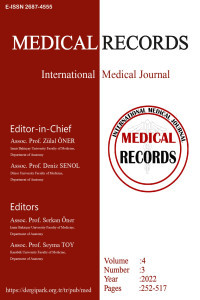Ekbom Sendromu Belirtileri ve Trifluoperazin Kullanımı ile Tedavisi
Madde kullanımı şizofreni ile sonuçlanabilir. Ekbom sendromu, herhangi bir kanıt olmadan parazitlerle enfekte olduğu sabit ve yanlış öznel inancı ile karakterizedir ve şizofrenide görülebilir. Bu hastalar genellikle psikiyatri dışı hekimlere başvururlar ve psikiyatrik başvuru sırasında psikiyatrik tedaviye olan inançlarını kaybetmişlerdir. Bu nedenle erken tanı ve takip eden psikiyatrik tedavi önemlidir. Antipsikotikler tedavide kullanılabilir, ancak ilaç yanıt özellikleri değişkenlik gösterir. Yaygın olarak kullanılan ilaçlarla herhangi bir yanıt alınmadığında, geleneksel antipsikotikler düşünülebilir. Bu olgu sunumunda, kısa süreli trifluoperazin tedavisi ile semptomatik iyileşme gösteren Ekbom sendromlu bir erkek hastayı sunuyoruz.
Anahtar Kelimeler:
Ekbom sendromu, delüzyonel infestasyon, trifluoperazin, yalancı halüsinasyon
Symptoms of Ekbom Syndrome and Its Treatment with Trifluoperazine
Substance use may result in schizophrenia. Ekbom syndrome is characterized by the conviction of being infested by invisible mites or insects, despite clear evidence of the contrary and can be seen in schizophrenia. These patients usually go to non-psychiatric physicians and have lost faith in psychiatric treatment during psychiatric admission. Therefore, early diagnosis and subsequent psychiatric treatment are important. Antipsychotics can be used for treatment, but drug response characteristics vary. Conventional antipsychotics can be considered when there is no response with the commonly used drugs. In this case report, we present a male patient with Ekbom syndrome who had symptomatic improvement with short-term trifluoperazine therapy.
___
- 1. Orum MH, Kustepe A, Kara MZ, Dumlupinar E, Egilmez OB, Ozen ME, Kalenderoglu A. Addiction profiles of patients with substance dependency living in Adiyaman province. Medicine Science 2018;7(2):369-72.
- 2. Orum MH, Kara MZ, Egilmez OB, Ozen ME, Kalenderoglu A. Evaluation of probation implementations of drug users in Adiyaman university training and research hospital: A one-year retrospective study. Medicine Science 2018;7(4):754-8.
- 3. Beckmann D, Lowman KL, Nargiso J, McKowen J, Watt L, Yule AM. Substance-induced psychosis in youth. Child Adolesc Psychiatr Clin N Am 2020;29(1):131-43.
- 4. Özen ME, Örüm MH, Kalenderoğlu A. Hot shower therapy in cannabinoid hyperemesis syndrome: A case report. FNG & Bilim Tıp Dergisi 2018;4(3):142-4.
- 5. Mumcuoglu KY, Leibovici V, Reuveni I, Bonne O. Delusional parasitosis: Diagnosis and treatment. Isr Med Assoc J 2018;20(7):456-60.
- 6. Farris MS, Shakeel MK, Addington J. Cannabis use in individuals at clinical high-risk for psychosis: a comprehensive review. Soc Psychiatry Psychiatr Epidemiol 2019. Doi: 10.1007/s00127-019-01810-x.
- 7. Campbell EH, Elston DM, Hawthorne JD, Beckert DR. Diagnosis and management of delusional parasitosis. J Am Acad Dermatol 2019;80(5):1428-34.
- 8. Barone Y, Niolu C, Zanasi M, Siracusano A. Ekbom syndrome treated with olanzapine: a case report Sindrome di Ekbom trattata con olanzapina: un caso clinic. Journal of Psychopathology 2014;20:66-8.
- 9. Orum MH, Egilmez OB. Compulsive water drinking resulting in hyponatremia: A pimozide case. Med Records 2019;1(2):48-9.
- Yayın Aralığı: Yılda 3 Sayı
- Başlangıç: 2019
- Yayıncı: Zülal ÖNER
